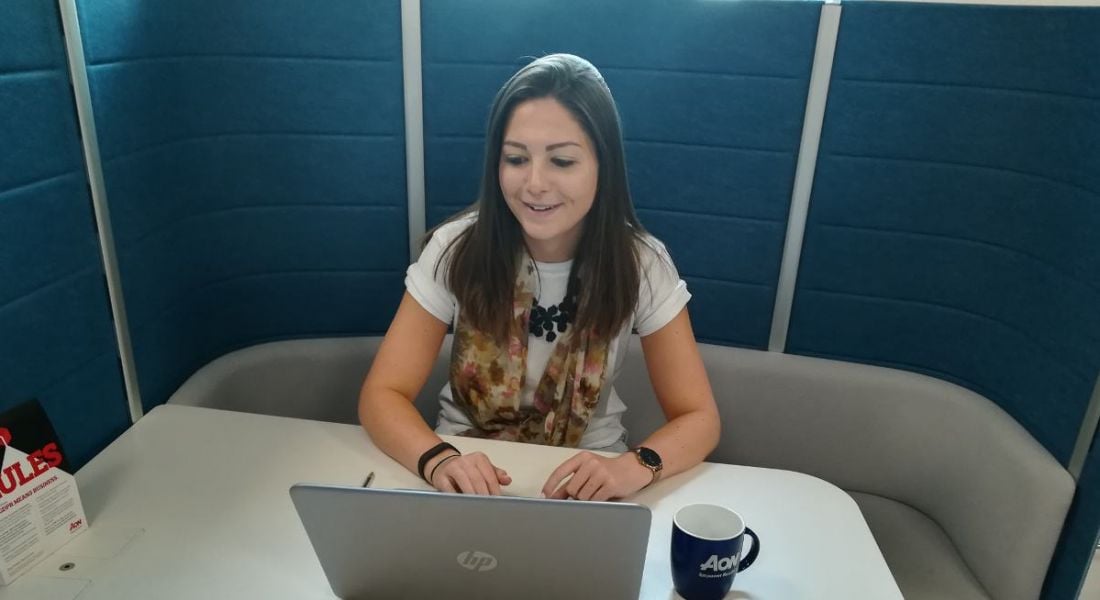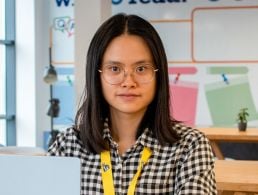Ella Lyons is now a portfolio management office analyst, but that’s not what she expected to be when she graduated.
When you’re a graduate, it can feel like the very next port of call is to get a job and start your working life. It can also sometimes feel like you need to get a job related to what you studied in college. However, this isn’t the case.
Knowing exactly what you want to do and being able to study it in college is great but, more often than not, certain degrees will give you adaptable skills that can help you transition into any number of roles.
It’s important for graduates to know that they have a huge number of options available to them and the perfect role might not be what they originally thought.
Ella Lyons entered the Aon Centre of Innovation and Analytics (ACIA) on its graduate programme. Having previously studied mechanical engineering, she never thought she’d end up in the role she has now.
Here, she tells Siliconrepublic.com how that came about and what her experience was like as a graduate with ACIA.
What did you study in college?
I studied mechanical engineering at Trinity in 2016 and graduated with a first-class honours degree.
Many people ask me how I ended up as a portfolio management office analyst in Aon if I studied mechanical engineering but I myself was surprised. I love what I do now and really enjoy it. My college course was maths-based but I also covered innovation and problem-solving skills.
The reason why I chose the course was because I am very logical and I like to problem-solve. I didn’t ever want to be an engineer, but their skillset is so transferable, I wanted to keep my options open. My brother studied mechanical engineering before me, so his experience definitely affected my decision, too.
During my college course, I became an instructor at DCU in a variety of subjects such as maths, engineering, strategy games, electrical engineering, aeronautical engineering and extracurricular classes for children who have high academic ability.
With this programme, are you now working in your desired industry?
Yes, I am very analytical and strategic, so a job in portfolio management in an analytics and innovation centre is perfect for me.
I do enjoy my job and I enjoy the people I work with, which is very important to me as I value work culture a lot. As I’m part of the portfolio management team, I work on the office of the CEO team, analysing data with regard to budget and resourcing needs as well as project management. I do a lot of analysis on Alteryx and then build Tableau dashboards with these outputs.
I have previously worked as a market and research analyst, in which my role was a project manager, and I enjoyed it. So, when I came to ACIA, I explained my experience and what I enjoy and they put me on a team to best suit my skills.
What drew you to ACIA when you were seeking work as a graduate?
Aon is such a big company, it means they have many employees with varying skillsets. You work alongside these people every day and therefore can learn a huge amount.
On top of that, there are so many business units; the opportunities for learning are endless. What really attracted me was the importance of innovation and collaboration in the company.
The skillsets and learning opportunities that I would gain from ACIA was a real bonus as I am always interested in learning new things and meeting new people.
What expectations did you have before you began the programme?
I expected to be challenged and I expected to learn a huge amount about myself and what a career in analytics would be like.
I had no experience of the industry that ACIA is in, and it felt a bit daunting as I was unsure what to expect. I just knew myself that I would learn a lot and gain experience.
What duties and responsibilities were you given initially?
I was immediately given ownership of certain processes. I was given the opportunity to come up with new ideas and create new products that will enable the centre to perform day-to-day tasks more effectively and more efficiently. I was happy with the workload I was given at the start as it encouraged me to learn about the company.
I was given guidance by my manager along the way, which I am grateful for as it was nice to get a helping hand when first joining the company. I feel more confident now in my role.
Did the scope of your work change as the programme progressed?
Yes, absolutely. The volume of responsibility grew immensely through the programme. It was something I pushed for and my manager was fantastic at making sure my workload was right for me.
As the weeks and months went on, I was given more responsibilities and my workload increased but was still manageable.
My manager, Claire, was there to lend a helping hand when needed and so were my other work colleagues. However, I felt more independent and confident as the weeks went on in my role as I learned so much and still continue learning.
Can you describe a typical day in your role?
I can’t! Every day is different, but I mainly have a few hours of meetings with teams across the centre, manage resource movements between teams, build new Tableau dashboards and refresh current ones.
I plan ahead and try to even out my workload across the week. I work alongside people each day. I have a lot of meetings, which is great as it builds up my network and presentation skills.
How do your responsibilities compare to more experienced employees’?
I feel like I have a lot of responsibility relative to my experience, which is what I like in a job. Obviously, more experienced employees have more responsibility, but I definitely feel challenged and have ownership of a lot of things.
Do you feel more prepared for working life after completing this programme?
Yes, I do. I gained so much experience with ACIA and built up my network. I was given a contract to be permanent, which I am grateful for as I couldn’t imagine myself working in another company right now because I enjoy the work I do. Also, the people I work with are so knowledgeable and so helpful towards me.
The graduate programme acted as a stepping stone for my career. During the programme, I was given the opportunity to travel to Kraków and London, which I really enjoyed as I increased my network, built relationships and learned new skills. It’s always nice to put a face to the names you hear on conference calls.
Why should someone apply for the graduate programme at ACIA?
It is a great stepping stone to kick-start someone’s career. I was surprised that it was such a learning environment at ACIA and the learning never stops.
HR will make sure to place you in a team that matches your skillset. You will also get the opportunity to move between projects and roles as you desire.
All the people that work here are very helpful and open-minded. I love the fact that the office is open-plan as there are no closed doors and you can walk up to anyone and ask a question.
I would recommend the graduate programme as there is a variety of roles. What I really appreciate is that ACIA caters to you as a person and your skillset, and puts you on a team that will help you thrive in the environment and advance your career.




